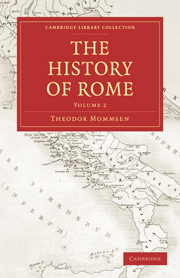Book contents
- Frontmatter
- Contents
- MAP OF ITALY
- BOOK THIRD: FROM THE UNION OF ITALY TO THE SUBJUGATION OF CARTHAGE AND OF THE GREEK STATES
- CHAPTER I CARTHAGE
- CHAPTER II THE WAR BETWEEN ROME AND CARTHAGE CONCERNING SICILY
- CHAPTER III THE EXTENSION OF ITALY TO ITS NATURAL BOUNDARIES
- CHAPTER IV HAMILCAR AND HANNIBAL
- CHAPTER V THE WAR UNDER HANNIBAL TO THE BATTLE OF CANNÆ
- CHAPTER VI THE WAR UNDER HANNIBAL FROM CANNÆ TO ZAMA
- CHAPTER VII THE WEST FROM THE PEACE OF HANNIBAL TO THE CLOSE OF THE THIRD PERIOD
- CHAPTER VIII THE EASTERN NATIONS AND THE SECOND MACEDONIAN WAR
- CHAPTER IX THE WAR WITH ANTIOCHUS OF ASIA
- CHAPTER X THE THIRD MACEDONIAN WAR
- CHAPTER XI THE GOVERNMENT AND THE GOVERNED
- CHAPTER XII THE MANAGEMENT OF LAND AND OF CAPITAL
- CHAPTER XIII FAITH AND MANNERS
- CHAPTER XIV LITERATURE AND ART
- CORRECTIONS
CHAPTER I - CARTHAGE
Published online by Cambridge University Press: 05 October 2010
- Frontmatter
- Contents
- MAP OF ITALY
- BOOK THIRD: FROM THE UNION OF ITALY TO THE SUBJUGATION OF CARTHAGE AND OF THE GREEK STATES
- CHAPTER I CARTHAGE
- CHAPTER II THE WAR BETWEEN ROME AND CARTHAGE CONCERNING SICILY
- CHAPTER III THE EXTENSION OF ITALY TO ITS NATURAL BOUNDARIES
- CHAPTER IV HAMILCAR AND HANNIBAL
- CHAPTER V THE WAR UNDER HANNIBAL TO THE BATTLE OF CANNÆ
- CHAPTER VI THE WAR UNDER HANNIBAL FROM CANNÆ TO ZAMA
- CHAPTER VII THE WEST FROM THE PEACE OF HANNIBAL TO THE CLOSE OF THE THIRD PERIOD
- CHAPTER VIII THE EASTERN NATIONS AND THE SECOND MACEDONIAN WAR
- CHAPTER IX THE WAR WITH ANTIOCHUS OF ASIA
- CHAPTER X THE THIRD MACEDONIAN WAR
- CHAPTER XI THE GOVERNMENT AND THE GOVERNED
- CHAPTER XII THE MANAGEMENT OF LAND AND OF CAPITAL
- CHAPTER XIII FAITH AND MANNERS
- CHAPTER XIV LITERATURE AND ART
- CORRECTIONS
Summary
The Phœnicians
The Semitic stock occupied a place amidst, and yet aloof from, the nations of the ancient classical world. The true centre of the former lay in the East, that of the latter in the region of the Mediterranean; and, however wars and migrations may have altered the line of demarcation and thrown the races across each other's path, a deep sense of diversity has always severed, and still severs, the Indo-Germanic peoples from the Syrian, Israelite, and Arabic nations. This diversity was no less marked in the case of that Semitic people, which spread more than any other in the direction of the west - the Phoenicians or Punians. Their native seat was the narrow border of coast bounded by Asia Minor, the highlands of Syria, and Egypt, and was called Canaan, that is, the “plain.” This was the only name which the nation itself made use of; even in Christian times the African farmer called himself a Canaanite. But Canaan received from the Hellenes the name of Phœnike, the “land of purple,” or “land of the red men,” and the Italians also were accustomed, as we are accustomed still, to call the Canaanites Phœnicians.
Their commerce
The land was well adapted for agriculture; but its excellent harbours and the abundant supply of timber and of metals eminently favoured the growth of commerce, and it was there perhaps, where the opulent eastern continent abuts on the wide-spreading Mediterranean so rich in harbours and islands, that commerce first dawned in all its greatness upon man.
- Type
- Chapter
- Information
- The History of Rome , pp. 3 - 27Publisher: Cambridge University PressPrint publication year: 2010First published in: 1862



